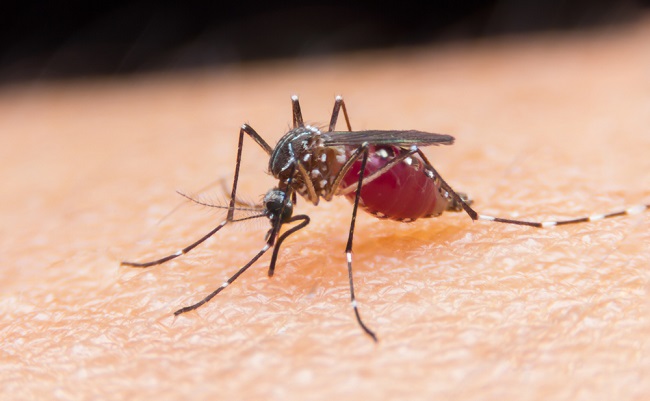New research sheds light on how malaria parasites adapt to their human hosts
Published: 14 March 2023
A study has characterised the factors that cause the malaria parasite, Plasmodium falciparum, to invest resources into reproduction – to maximise transmission to other hosts – or replication – to ensure survival within its current human host
A study has characterised the factors that cause the malaria parasite, Plasmodium falciparum, to invest resources into reproduction – to maximise transmission to other hosts – or replication – to ensure survival within its current human host.
The findings, published in eLife and led by researchers at the KEMRI-Wellcome Trust and the University of Glasgow, shed further light on how malaria parasites adapt to changing within-human environments as a result of changing transmission intensity – a measure of the level of transmission of the malaria parasite in a particular area.

The research shows that the inflammatory responses to malaria infection in the human body during low transmission are associated with reduced levels of a chemical called lysophospatidylcholine (LPC) in the blood plasma. These low levels of LPC are associated with increased parasite investment into transmission to another host, by increasing sexual reproduction and decreasing asexual replication.
Malaria represents one of the world’s greatest public health concerns; In 2021, an estimated 619,000 deaths and 247 million cases were reported. Around 70% of malaria deaths occur in children under the age of five in Africa and are caused by a single parasite, P. falciparum. In order to transmit from one human host to another, the parasite must first transfer to a mosquito. This requires the parasite to differentiate into specialised cells called gametocytes – cells which eventually become gametes which are necessary for sexual reproduction.
“P. falciparum has a complex life cycle, involving asexual replication in human blood, and differentiation into gametocytes required for transmission to mosquitoes,” explains lead author Abdirahman Abdi, a Senior Research Scientist at the KEMRI Wellcome Trust Research Programme, Kilifi, Kenya and the Pwani University Biosciences Research Centre, Pwani University, Kilifi, Kenya. “Differentiation in gametocytes is known to be marked by the activation of a gene called ap2-g in the parasite. However, the factors that lead to activation of this gene have not previously been well characterised.”
To address this gap, Abdi and colleagues analysed data from 828 children in Kilifi, Kenya with severe, mild and asymptomatic malaria between 1994 and 2014. Across this cohort, they examined markers of host immune responses and metabolism and compared markers of parasite growth and transmission investment. In particular, they examined two parasite genes: ap2-g (a transcription factor required for gametocyte activation) and PfSir2a (an environmental sensor linked to regulation of antigenic variation and replication), and a marker for parasite biomass. Investigating these parameters together allowed the team to determine parasite investment in the context of changing transmission intensity and host immunity.
Complementing recent studies, they found that at lower transmission intensities, ap2-g is activated at a higher rate. Further analysis revealed that this ap2-g activation strongly correlated with increased activation of the gametocyte marker Pfs16, confirming that ap2-g activation causes increased investment in gametocyte production. Levels of both ap2-g and PfSir2a were found to increase with fever in the human host body, suggesting gametocyte production is sensitive to changes in the host inflammatory immune response.
The team had previously shown that a compound called LPC is required for asexual replication (and repression of gametocyte production) in malaria parasites in an experimental setting. So, they next sought to validate this finding in the cohort of patients. They performed an analysis of the blood plasma of a representative subset of the cohort to explore how host inflammatory immune responses affect levels of LPC and consequently levels of ap2-g and PfSir2a. High levels of inflammation in the human host were found to be associated with lower levels of LPC, therefore reducing the nutrients available for parasite replication. Low levels of LPC were also found to be associated with ap2-g activation and increased PfSir2a expression, suggesting that P. falciparum is able to sense levels of LPC. When inflammation in the human host is high and LPC is depleted, the parasite invests in production of gametocytes in order to transmit to a mosquito and find another human host, as gametocytes require fewer nutritional resources and represent a more viable survival strategy.
“We propose a model where falling host immunity and declining transmission intensity modifies the host environment for the parasite, resulting in increased parasite investment in transmission and a limiting of replication.” concludes senior author Matthias Marti, a Professor at the Wellcome Center for Integrative Parasitology, Institute of Infection and Immunity, University of Glasgow, Scotland, UK, and the Institute of Parasitology, Vetsuisse and Medical Facility, University of Zurich, Switzerland.
“Our findings provide critical information to accurately model parasite dynamics, particularly at low transmission intensity. This could inform timelines for successful elimination of malaria parasites, and also provides a strong argument for the potential use of gametocytocidal drugs once transmission has successfully been reduced.”
Enquiries: ali.howard@glasgow.ac.uk or elizabeth.mcmeekin@glasgow.ac.uk / 0141 330 6557 or 0141 330 4831
First published: 14 March 2023
<< March

